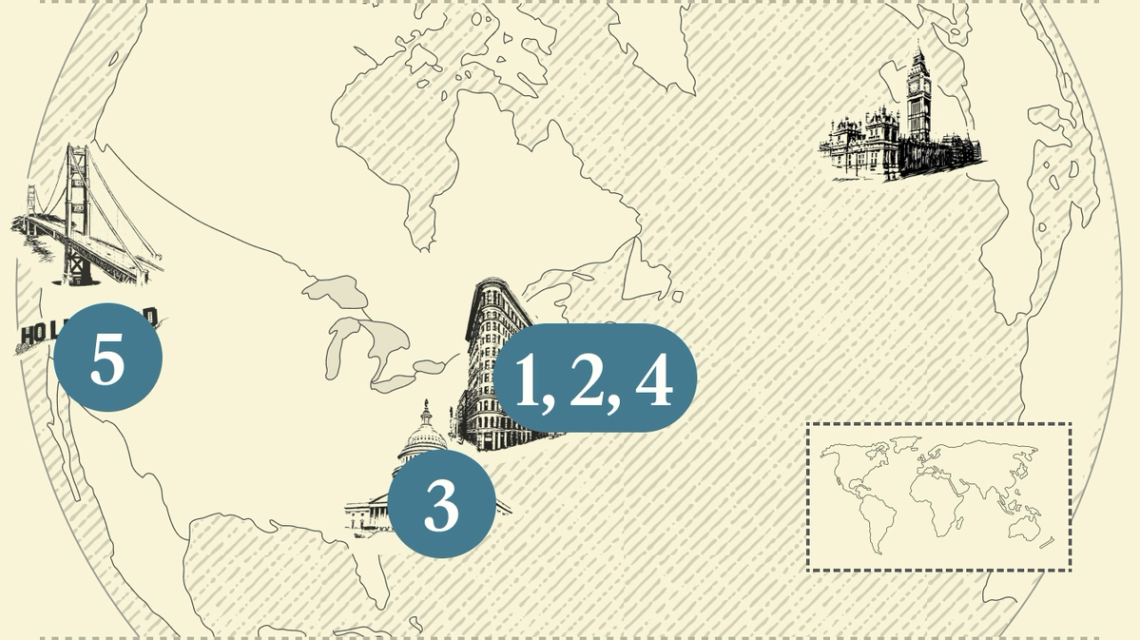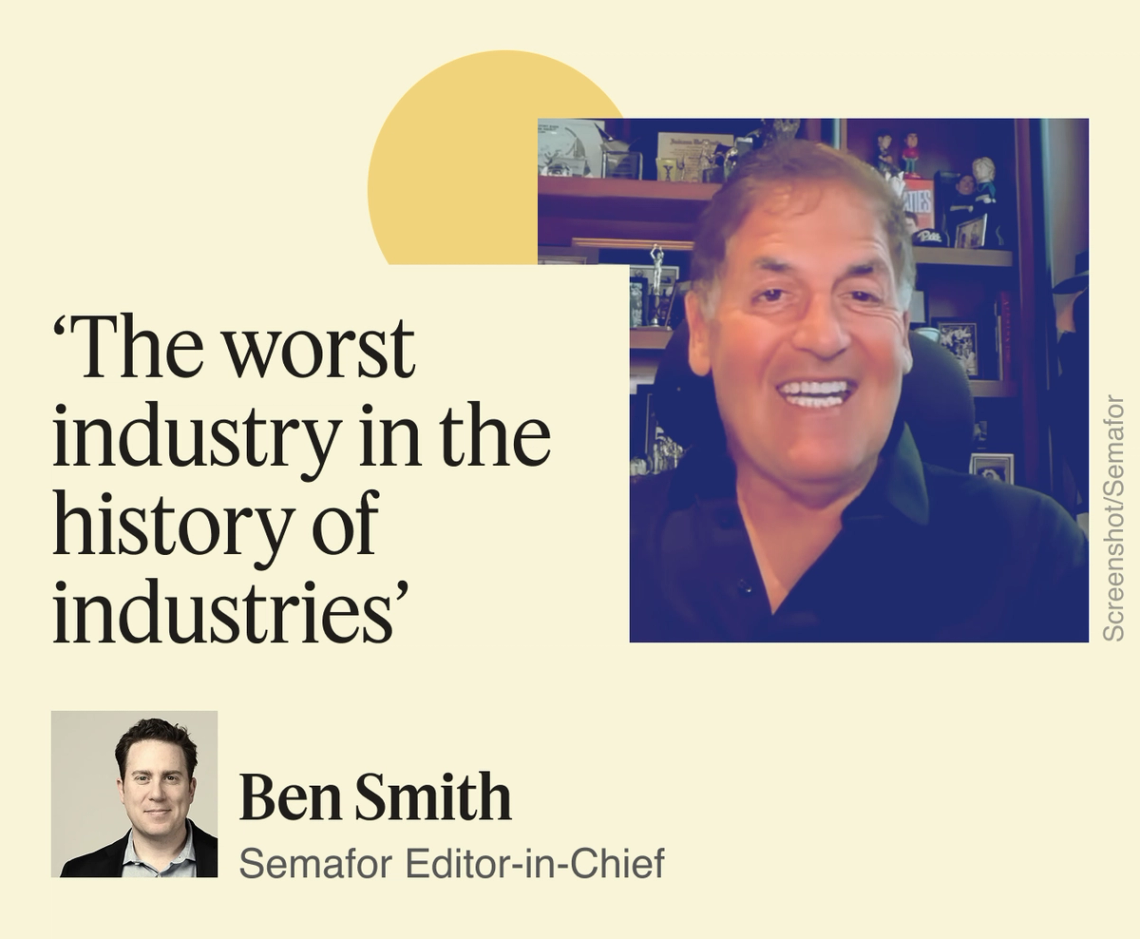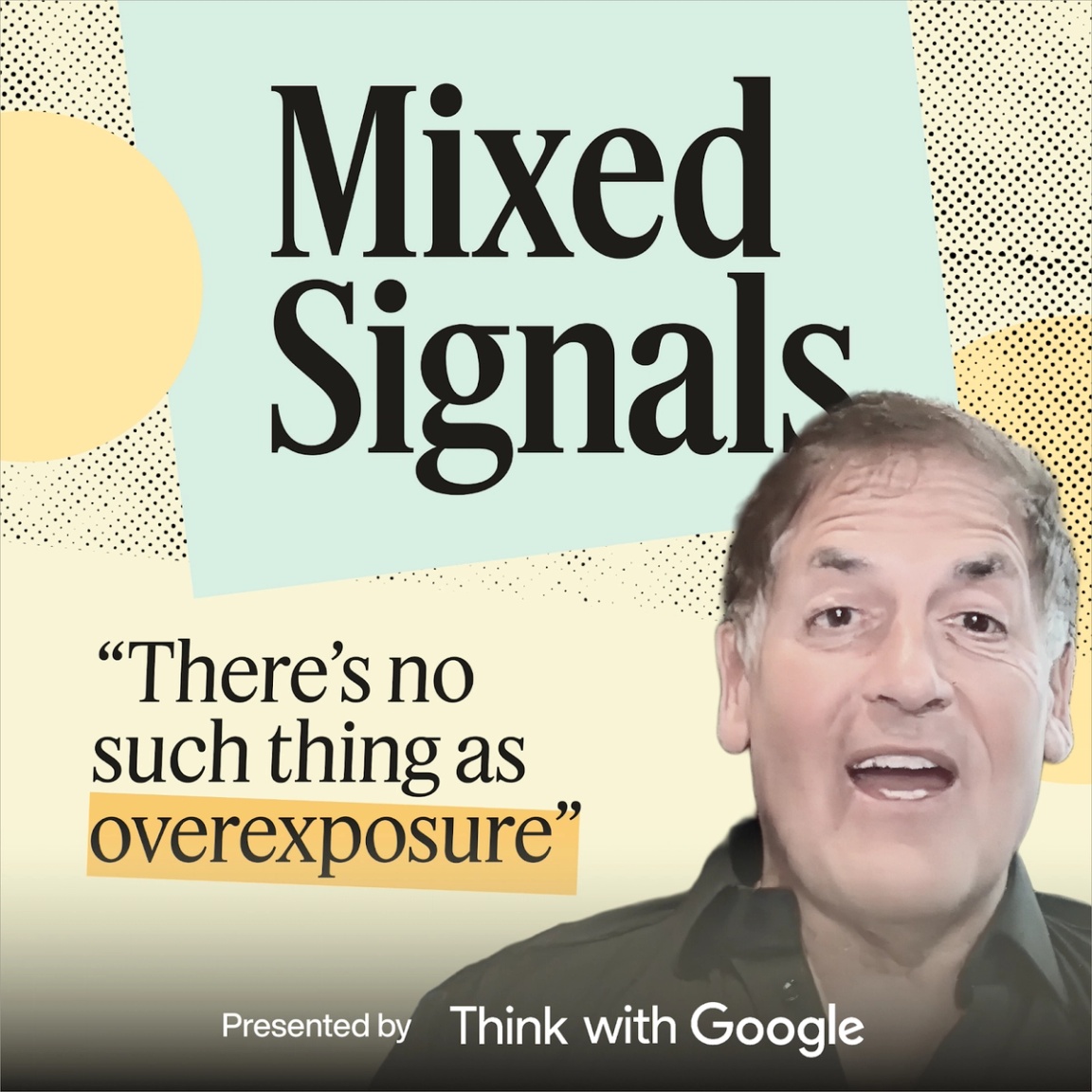| | In today’s edition: A new publication on the left. ͏ ͏ ͏ ͏ ͏ ͏ |
| |   New York New York |   San Francisco San Francisco |   Washington Washington |
 | Media |  |
| |
|
 - New left publication
- Mixed Signals
- YouTuber vs. NYT
- Substack vs. Beehiiv
- Brand California
|
|
 Mark Cuban’s big score was the 1999 sale of an early streaming service to Yahoo for $5.7 billion. On Mixed Signals this week, Max asked him why he doesn’t invest in media anymore. “Oh,” he replied cheerfully, “it’s the worst industry in the history of industries! You know: clothing, music, media.” Labor-intensive, sensitive to shifts in culture, resistant to scale, and notoriously populated by divas, media has been poison to investors for decades. The industry’s titan, Disney, is 46th on the Fortune 500. Fox Corp., the closest thing the public markets have to a news business, is 308th. News giants like The New York Times are far too small to make that list. That combination of commercial weakness and cultural power is what’s made businesses like CBS News such easy targets for a litigious president. And even as Big Media continues to limp along, I can’t remember a more dynamic time in this industry. This week’s newsletter — and, OK, it’s August and Max was (mostly) off this week — is full of ambitious companies that didn’t exist a few years ago, from Beehiiv to Channel 5 to, well, Semafor. Big media has been declining at varying rates for at least 20 years, and yet, it’s never been this exciting out there. Max will be back next week, and when he returns will be more clearly taking the lead in this space he and I have shared since Semafor’s launch nearly three years ago. I’ll still pop my head up, but have also been returning increasingly to my old beat, Washington, and plan to do more of that in the fall. (If you’ve got any good ideas for the name of a new column on that subject, please send it our way!) Also today: A new liberal publication with some big names. (Scoop count: 3) |
|
 The Argument The ArgumentA group of left-leaning writers and journalists are launching a new publication, The Argument, on Monday, aimed at pushing back against the populist right by strengthening the ideas and arguments of modern liberalism and convincing readers of their legitimacy. “To move out of this post-liberal, populist moment towards a better future — one with equal rights, material prosperity, and commitment to human progress — will require our government, culture, politics, and people to recommit ourselves to liberal values,” said Jerusalem Demsas, who left The Atlantic in recent weeks to be the new outlet’s editor-in-chief and CEO. “Persuading people here is not the work of 5,000 word treatises on the importance of liberal democracy or lectures about how bad the post-liberal world order is (we get it and no one cares; see the 2024 election!). It’s going to happen if people are convinced the lives they want — prosperous, safe, and free to live how they want — are best protected under liberalism.” The publication also plans to work with a large network of contributors, including Derek Thompson of Abundance fame, Atlantic contributor Adam Harris, blogger Matt Yglesias, and many others. |
|
 Mark Cuban is everywhere — and famously accessible. But what might be called overexposure in a previous era is now a strength in a fragmented media world, to the point that many people want him to run for president in 2028. This week, Ben and Max bring on the former Shark Tank “shark” and former majority-owner of the Dallas Mavericks to talk about how he predicted today’s media landscape in 1995, why he hates the media business, and why he thinks AI is the biggest threat to media and politics. They also discuss if he’ll actually run in 2028 and which Democratic candidates have the best shot. |
|
 Thomas Fuller/SOPA Images/LightRocket via Getty Images Thomas Fuller/SOPA Images/LightRocket via Getty ImagesThere’s nothing like a rival’s hot fundraising round to drive interest in your business, and when Substack raised $100 million at a valuation of more than $1 billion, it piqued investors’ interest in the newsletter biz. Some of that attention has been directed at Beehiiv, a company started by early Morning Brew employees that pitches more services to media startups — notably, advertising sales and web development. After an Information profile asked whether the company is “the next billion-dollar newsletter startup,” CEO Tyler Denk told me Beehiiv isn’t fundraising, but it is positioning itself vis-a-vis its main competitor: Its executives have been describing themselves as a customer-focused Shopify to Substack’s Amazon. Substack’s greatest strength at the moment is its emerging ability to drive subscribers from one newsletter to another, though writers have varying levels of enthusiasm about it. Substack’s valuation suggests a hope that consumers will develop a relationship with Substack itself — its content, but also its social platform, its app, and its network. Beehiiv, whose users include Oliver Darcy of Status and Lachlan Cartwright of Breaker, is also looking at ways for its newsletters to bundle. That could produce a real network effect, but it could be a fragile one. (If you’ve got a newsletter-bundling startup that doesn’t require my joining your platform, call me!) Meanwhile Beehiiv is offering money to stars to come its way, as Substack did a few years ago. Platforms of all sorts still need to demonstrate their value to individual journalists and other creators, who sometimes seem desperate for their support — and sometimes seem to be able to thrive regardless. |
|
 Screenshot/Channel 5 Screenshot/Channel 5The YouTuber Andrew Callaghan has been documenting off-kilter American politics since before the 2020 election, but the recent interview on his Channel 5 web show with an indignant Hunter Biden caught wide attention. Some of that came from Melania Trump, who has threatened to sue Biden for defamation over his claims about how she met her husband (which he in turn sourced to the writer Michael Wolff). Though Callaghan hasn’t faced a lawsuit threat himself, the first lady’s demands included that he remove the video from the internet, he said. Instead, Callaghan invited Biden back on to reject the demands — the sort of bravado you don’t see in broadcast much these days. Callaghan told me in an interview he finds the situation “just unbelievably preposterous” and that he’d never cave to the sort of Trump legal threats that have drawn a series of humiliating settlements from legacy media companies. He said he wasn’t sure if new media is braver or stupider in that regard: “It could be because you guys know more about [getting sued] than we do,” he said. Callaghan said he had also been working with The New York Times on an op-ed about the growing space for independent news and the threats to its freedom — but that Times editors ultimately spiked it, telling him the paper needed to pick its battles. A Times spokesman, Charlie Stadtlander, said the paper doesn’t discuss why submissions don’t run, “but any fair reading of our report[ing] will show we haven’t shied away from guest essays that challenge the Trump administration.” Callaghan said he plans to read the piece out on his YouTube channel: “You’re not supposed to be scared of the president!” |
|
 Mike Blake/Reuters Mike Blake/ReutersCalifornia Gov. Gavin Newsom’s increasingly vocal and confrontational bids to become the de facto leader of the Democratic Party make a lot of sense: Among the possible contenders, he has an unmatched combination of experience, access to money, and proven media chops. And yet, what about California? Won’t he be fatally tied to fires, tent cities, and a housing crisis? I asked that question recently to someone close to the governor, who pointed out that Newsom has chosen his response to this attack, and that if he runs it’ll be as the avatar of an underrated California Dream: “California has no peers. California dominates,” as Newsom told Florida Gov. Ron DeSantis in their 2023 debate, touting the world’s now fourth-largest economy’s prowess. “More scientists, more researchers, more engineers, more Nobel laureates in the state of California than any other state in the nation. … We dominate in green tech, we dominate in high-tech, we dominate in artificial intelligence.” It’s not the political conventional wisdom, but with San Francisco’s mayor among the most popular politicians in America among his constituents and state Assemblymember Buffy Wicks’ YIMBY crusade signed into law, it’s not as implausible as it sounds. |
|
 CBS News’ Hugo Rojo, who has led the network’s DC external comms, is leaving to head up communications at The Atlanta Journal-Constitution. In recent years, the Atlanta newspaper has undergone an aggressive effort to transform from a regional print daily into a modern multimedia company with a focus on digital … |
|
| |  | | | You’re receiving this email because you signed up for briefings from Semafor. |
|